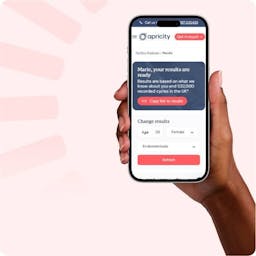Call us today on +44 7897 035438
The process of egg donation
Understand the egg donation process in the UK with Apricity. From egg collection to transfer, you’ll find that being a donor is safe, simple, quick, and rewarding.

Table of Contents
Knowing how egg donation in the UK works and exactly what is involved in donating eggs, is important. Apricity gives you all the information you need, answers your questions and will be there for you throughout the whole process. You will find that being an Apricity donor is safe, simple, quick, and rewarding.
The egg donation process for donors
What happens in the lead up to egg donor treatment may vary from place to place, but overall, treatment centres usually follow the same format. We will let you know how it all works, what to expect and will give you specific written information about the centre you will go to. Let’s look at each stage of the process in a little more detail:
1. Register your interest
The egg donation process starts when you register your interest to check if you’re able to donate and receive an information pack.
2. Think about it!
We encourage you to do research about the risks of egg donation and speak to family, friends and previous donors, so you can decide whether egg donation is right for you.
3. Apply
If you’d like to continue the process, please complete our donor application form (you will receive it by email after registering your interest). This is to ensure we have enough details about you so that in the next step (phone call), we can walk you through how egg donation would work for you, in your personal situation.
4. First call
Book a call with a member of the Apricity team. This is to explain the process, chat through your lifestyle and interests, and explore your and your family’s medical history to see if it’s possible for you to continue. It’s helpful to find out as much as you can about any conditions or illnesses blood relatives have been diagnosed with ahead of the call.

5. AMH test
If you are able to go ahead, we will send an AMH blood test to do at home. This is a hormone test that indicates whether you are producing enough eggs to be a donor.
6. Personal Profile
At the same time, we’ll ask you to complete a Personal Profile, a form with personal information such as what you do for work and fun, why you want to donate and some photos to help us with matching. This non-identifying information will later be shared with the person you have been matched with to help, so that they can get a feel for what you’re like as a person.
7. Second call
We’ll then ask you to schedule a second, 45-minute call to go through the finer details of the process, from matching to the actual egg donation procedure. With your permission, we’ll start the matching process, where we pair you with a recipient who would love your help.
8. Matching
Finding you a great match is the really exciting part for us – it’s where the magic happens!
As soon as you decide to go ahead with egg donation, we will ask you to provide a current photograph of yourself. Using the photo, we have already received from the recipient, we will start by considering the physical similarities between you both, including height, weight, ethnicity, hair colour and type and eye colour.
Getting this right is the easy bit and generally fairly straightforward. The next step of finding a match in terms of background, education, interests, and the types of people you both are, can sometimes take a little longer. That said, as extraordinary as it often seems, the right person seems to always come along at exactly the right time for whoever needs help, and things usually slot nicely into place!
If you are responding to a personal appeal from someone, then unless you are very different, you will most likely be donating eggs to them.
Here’s a typical example of how well this can work:
‘Sarah’ came to us in need of an egg donation. She had been trying for a baby for over five years, and after several early miscarriages, eventually discovered that she carried a gene that prevented her from having children. She was a chef, loved cats, hated spiders, and enjoyed going to concerts (particularly Glastonbury). She had a great sense of humour, and even listed all the comedians and comedies she loved to watch on TV. She described herself as fun, bubbly and always wanting people to feel that she had time for them.
She advertised for a donor, and we waited and waited for someone to come forward. No-one did.
Many months later, ‘Anna’ just happened to be taking her toddler to her health centre for routine jabs. Whilst waiting she picked up a magazine and saw one of our adverts – which by then was several months out of date. She had already considered donating eggs but didn’t know how to start the egg donation process, so just on the off chance she gave us a ring. Her opening words to us were: “I would just love to help, but I don’t know if I can. I’m a chef and work long hours …”
Amazingly enough Sarah and Anna were an almost perfect physical match, and Anna’s ‘autobiography’ mirrored much of what Sarah had already said. Anna went on to become an egg donor and Sarah now has the child she longed for! It really can and does happen like that.
Choosing to donate to a matched person, rather than to a general egg bank, makes this a very personal donation. It is therefore quite understandable that you would like to know as much as possible about the people you are donating eggs to, and why they need your help. On the other hand, you may not want to know anything at all and that is absolutely fine.
Exactly how much information can be disclosed will be down to whoever you will be helping – and, of course, down to how much you feel you would like to know. We will pass on as much non-identifying information as we can. This might include their approximate ages, what they do, why they need your help and how long they have been trying for a baby. Learn more about theegg donor matching process.

9. Screening
One of the perks of being an egg donor is that you will receive a full fertility assessment for free. This assessment will give you a detailed picture of your fertility status and valuable insight into your health and how you should approach planning for a family of your own. Once you’re referred to a clinic, we’ll arrange appointments for a counselling session, a medical consultation, and medical screening at a clinic or scanning centre as close to you as possible, to make sure that you can continue.
There is no need to be worried about your first in-person appointment, or any of the appointments that follow for that matter! During the first appointment the doctor will take your full medical history, discuss the egg donation process with you in detail, and begin the routine screening process. Screening will involve taking a blood sample to test for certain conditions – something that the doctor will explain to you at the time.
It is highly likely that you will have a discussion regarding managing contraception, particularly if you have either a coil or implant in place. It is also likely that you will be put on the pill so that your cycle of treatment can be easily managed. You will need to have an internal scan to check that there are no underlying problems with your ovaries or womb, and vaginal swabs will be taken to rule out any infection.
The purpose of this initial appointment is to make sure that it’s not going to affect your health or fertility in any way by donating eggs. If there is any chance that by going forward the process could affect you, you would not be allowed to continue.
Sometimes you will be offered a second appointment (convenient to you) with a doctor about six to eight weeks after the first. The purpose of this appointment is:
For the doctor to talk you through the results of the tests.
To go through the consent forms for donating eggs which you will sign.
To give you a prescription for the drugs that you will need to take.
To see a nurse who will explain the egg donation process and start you off on the egg donation treatment cycle. It will be your decision as to when it is convenient for you to start.
10. Treatment
If the results are positive, you can begin the treatment side which involves taking small injections for two weeks. You’ll have monitoring scans every 2-3 days during the second week to ensure that things are progressing smoothly and have someone from the team there for you every step.
Here’s a bit of biology that you might not know: during a natural menstrual (monthly) cycle, you produce a hormone called FSH (follicle stimulating hormone). This hormone usually stimulates a group of about 10 eggs to develop every month, one of which then matures and goes on to ovulate; the others simply disintegrate and are reabsorbed.
During the egg donation process, egg donors undergo a very quick IVF treatment cycle in which the ovaries are stimulated with the same hormone (FSH), to encourage this naturally-developing group of eggs all to reach the same level of maturity, rather than just the one.
While the drugs, dosages and regimes can vary in an egg donation process, they all aim for the same end result – to get this group of eggs ready for fertilisation so that the best embryos can be selected for replacement.
11. Egg Collection
Once you reach the end of the treatment cycle, you’ll go into the clinic for egg collection, a painless, minor procedure that takes around 20 minutes. We’d like to reassure you that it is very rare to experience any pain during egg collection. We will tell you how many eggs you have produced and how many embryos have been created from the process of your egg donation.
The embryos created from your eggs will be transferred to a very grateful woman or couple, who have little or no chance of conceiving without help from generous women like you.Any spare embryos can, with your consent, sometimes be frozen for the recipient’s use in the future. Our pregnancy rates are excellent, so there is a very good chance that your donation will be successful, and we can let you know the outcome.

What happens after egg collection?
Once the eggs have been collected from a donor, they are placed in small dishes and kept in an incubator for the remainder of the day. A prepared semen sample from the egg recipient’s partner is then placed with the eggs and the dishes are left in the incubator overnight to allow fertilisation to take place. All being well, by the following morning there should be signs that fertilisation has occurred with embryos starting to form.
Fertilised eggs are embryos that should divide and develop; ready to be transferred into the uterus (womb) of the recipient several days after fertilisation has occurred.
The embryo transfer
Embryo transfer takes place three to five days after egg collection, when the best one or two embryos are selected by the embryologist and placed in the womb of the recipient. During this procedure an ultrasound scan is used to guide and place the embryos to where they have the highest chance of implantation. Guidelines allow the transfer of a maximum of two embryos; the decision regarding the number to be transferred ultimately lies with the clinical team.
If you have given your consent to do so, any remaining embryos are assessed for suitability to be frozen for the couple, should they decide to add to their family in the future.
Embryos and blastocysts
Life begins as two, then four, then eight-cell embryos.
The cells of the embryo keep dividing on a daily basis until they reach a cluster of cells. At this stage, the embryo becomes a blastocyst. Transferring a blastocyst usually takes place on Day 5 after egg collection – an ideal stage of development that gives the recipient the very best chance of becoming pregnant.
When will the recipient know if she is pregnant?
After the embryo transfer, the recipient will have around 14 days – the ‘two week wait’ – until they find out whether or not treatment has been successful, and she is pregnant.
Generally, there is a 60-70% overall chance of the recipient conceiving, using the egg donation and any others from the process that she decided to freeze. We will keep you informed along the way and tell you how many eggs and embryos there are and whether or not they resulted in a pregnancy.
We will also let you know whether or not a baby was born as a result of your incredibly generous egg donation.
Ready to get started?
Apricity is 100% committed to giving you all the information and support you need to make donating eggs an easy and rewarding experience. Get started today byregistering your interest.

Written by Apricity Team
Helping you stay informedWritten by our group of fertility experts and doctors consultants
Written by our group of fertility experts and doctors consultants
Keep reading
Why Apricity
Preserve Fertility
Fertility Treatments
Egg Donation
Ⓒ Apricity Fertility UK Limited. All rights reserved


